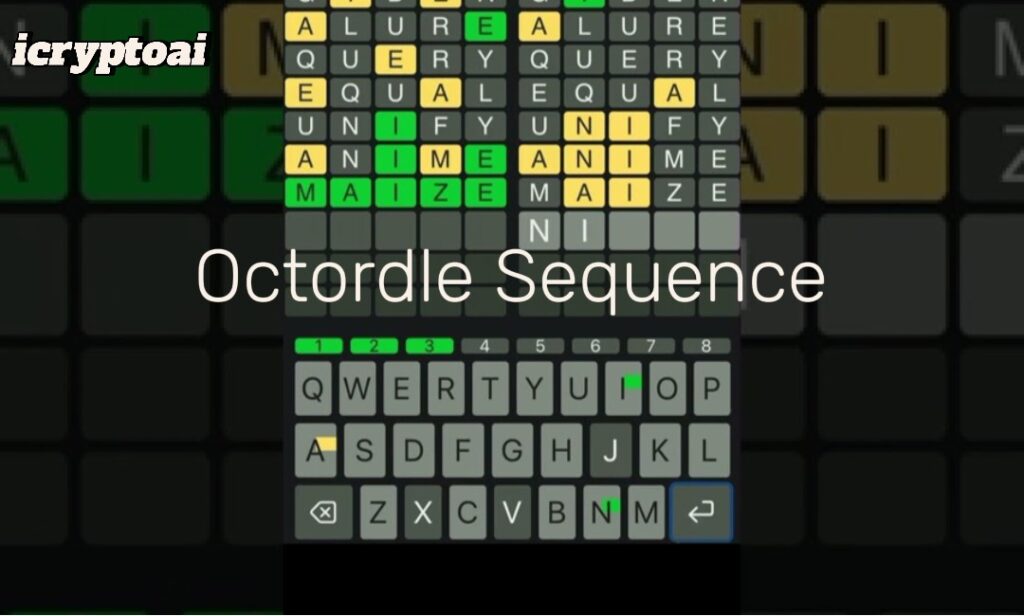Decoding the Octordle Sequence: Strategy, Statistics, and the Allure of Eight-Wordle Chaos

Octordle Sequence, the brutally challenging variant of the viral word game Wordle, has captivated and frustrated players in equal measure. While Wordle asks you to solve a single five-letter word in six attempts, Octordle throws eight simultaneous puzzles at you, demanding a strategic approach and a hefty dose of luck. This article delves deep into the world of Octordle, exploring optimal strategies, analyzing the statistical challenges, examining the community’s response, and ultimately, understanding the enduring appeal of this uniquely demanding word game.
The Genesis of Octordle: From Wordle to Octuple the Challenge
Octordle emerged in early 2022, created by developer Matthew Tweet. Building upon the phenomenal success of Wordle, Tweet recognized a desire for a significantly more difficult iteration. The core concept remained the same – guessing five-letter words based on color-coded feedback – but the sheer scale of eight simultaneous puzzles dramatically increased the complexity. Unlike Wordle, where players can focus their efforts on a single word, Octordle requires a constant juggling act, forcing players to manage multiple lines of inquiry simultaneously.
The game quickly gained traction, fueled by social media sharing and the inherent challenge it presented. Players boasted about their solve counts, shared strategies, and commiserated over particularly frustrating losses. Octordle tapped into the same addictive qualities as Wordle – the satisfaction of deduction, the thrill of the chase, and the social element of sharing results – but amplified them exponentially.
The Strategic Landscape: Navigating the Octordle Sequence Maze
Successfully tackling Octordle requires a fundamentally different approach than Wordle. Blindly guessing isn’t a viable strategy; a methodical and informed approach is crucial. Here’s a breakdown of key strategies employed by successful Octordle players:
- Strategic Starting Words: Choosing the right starting words is paramount. Words with common vowels and consonants (like “ADIEU,” “AUDIO,” “TEARS,” or “STARE”) are favored, aiming to reveal as much information as possible across multiple boards. The goal is to eliminate common letters quickly.
- Prioritizing Boards: Early on, it’s vital to identify which boards are yielding the most information. Focus your subsequent guesses on those boards, maximizing the potential for breakthroughs. Boards with multiple correct letters or a clear pattern should take precedence.
- Letter Frequency Analysis: Keep track of the letters you’ve eliminated and the letters that appear frequently. This helps narrow down the possibilities and avoid redundant guesses.
- Avoiding Redundancy: Don’t waste guesses on words that reuse letters you’ve already ruled out. Each guess should aim to uncover new information.
- Pattern Recognition: Look for common word patterns (e.g., double letters, common suffixes/prefixes). This can help you deduce potential solutions.
- The “Vowel Dump”: If early guesses reveal few correct letters, a “vowel dump” – using a word with multiple vowels – can help uncover hidden vowel placements.
- Late-Game Focus: As you narrow down the possibilities, focus on boards that are closest to being solved. Don’t get bogged down trying to solve all eight simultaneously; prioritize the easiest wins.
The Statistical Challenges: A Numbers Game Octordle Sequence
The statistical probability of solving Octordle is significantly lower than Wordle. Let’s break down the numbers:
- Wordle: With a 5-letter word and approximately 12,972 possible solutions (as of February 2024), the probability of solving in six guesses is reasonably high.
- Octordle: The probability of solving all eight words in 13 guesses (the maximum allowed) is astronomically low. Each board has the same 12,972 possibilities, meaning there are 12,972^8 possible combinations. Even with optimal strategy, the odds are stacked against the player.
The sheer number of possibilities makes Octordle a game of both skill and luck. A well-executed strategy can improve your chances, but ultimately, a degree of fortunate guessing is often required. The game’s difficulty is a key part of its appeal, providing a satisfying sense of accomplishment when a solution is finally achieved.

The Octordle Sequence Community: Sharing Strategies and Celebrating Victories
Like Wordle, Octordle has fostered a vibrant online community. Players share their solve counts on social media platforms like Twitter (now X), using hashtags like #Octordle and #OctordleSequence. Online forums and Reddit communities dedicated to Octordle provide spaces for players to discuss strategies, analyze patterns, and commiserate over difficult puzzles.
The community aspect adds another layer of enjoyment to the game. Players can learn from each other, share tips, and celebrate their successes. The competitive element – striving for faster solve times and lower guess counts – also motivates players to refine their strategies.
Analyzing the Octordle Sequence: The Role of Randomness and Word Choice
The “Octordle Sequence” refers to the specific set of eight words chosen for each daily puzzle. The sequence is generated randomly from the Wordle word list, but some sequences are demonstrably more difficult than others. Factors contributing to difficulty include:
- Letter Overlap: Sequences with significant letter overlap can be particularly challenging, as it requires careful tracking of letter placements across multiple boards.
- Uncommon Letters: Sequences containing words with rare letters (like “J,” “Q,” “X,” or “Z”) can be difficult to crack.
- Similar Word Structures: Sequences with words that share similar structures (e.g., multiple words ending in “-ING”) can lead to confusion.
- Ambiguous Patterns: Sequences with words that have ambiguous letter patterns can be difficult to decipher.
The randomness of the sequence ensures that each day presents a unique challenge. Some days, players will breeze through the puzzle in a few guesses; other days, they’ll struggle to make any progress.
The Enduring Appeal of Octordle: Why We Keep Coming Back for More
Despite its difficulty, Octordle continues to attract a dedicated following. Several factors contribute to its enduring appeal:
- The Challenge: The game provides a significant mental challenge, appealing to players who enjoy problem-solving and strategic thinking.
- The Satisfaction of Victory: Successfully solving Octordle is incredibly rewarding, providing a sense of accomplishment that is far greater than solving a single Wordle.
- The Community: The vibrant online community fosters a sense of camaraderie and shared experience.
- The Daily Reset: The daily puzzle provides a consistent challenge and encourages players to return each day.
- The Extension of Wordle: Octordle builds upon the popular Wordle formula, offering a more complex and demanding experience for fans of the original game.
Octordle is more than just a word game; it’s a testament to the human desire for challenge, the power of community, and the enduring appeal of a well-designed puzzle. Whether you’re a seasoned Octordle veteran or a curious newcomer, the game offers a uniquely rewarding and frustrating experience that will keep you coming back for more. The Octordle sequence awaits – are you ready to take on the challenge?
Also Read Fintechzom.com Gold Price

